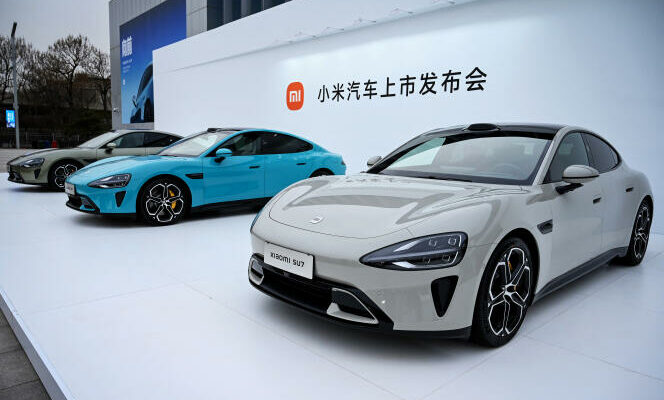PFor lovers of beautiful German cars, the Porsche Panamera is the dream compromise between the family car and the sports coupe that has made the Stuttgart (Germany) firm famous worldwide. The only problem is that prices start at 90,000 euros. The same goes for its little sister, more compact and in an electric version, the Taycan.
The dream suddenly becomes more accessible, at least for the Chinese customer. Xiaomi’s Speed Ultra 7 looks exactly like the Taycan, but it only costs 28,000 euros. Three to six times cheaper than luxury Porsches. Presenting it on Thursday March 28, Lei Jun, the founding CEO of the Chinese king of smartphones, added that its performance was even superior to that of its competitors, whether German or American, such as Tesla: a range of 800 kilometers and even more breathtaking acceleration.
Xiaomi, “little rice” in Chinese, is often portrayed as the “Chinese Apple”. Same science of innovation and the supply chain, same concern to build around its software architecture an entire universe of interconnected electronic gadgets, from the telephone to the vacuum cleaner, same diversification in services. Until Lei Jun’s cool and spectacular interventions modeled on Steve Jobs. But this time, the student surpassed the master. While Apple decided, in the same month of March, to dissolve its activity which was working on an electric car, the little grain of rice is launching itself into the deep end of the automobile market, ten times bigger than that of the mobile phone.
Doesn’t bode well for Western manufacturers
A very crowded bath since the emergence of electric propulsion, which is shaking up this more than century-old industry and already represents almost a quarter of global sales. In China alone, more than a hundred competitors are competing for the market. They were five times more numerous in 2019. Most disappear over the course of price wars. At 28,000 euros, the Speed Ultra 7 is not so much aimed at Porsche as at the Tesla Model 3, whose prices have been crushed in China, but which still sells there for around 2,000 euros more than that of Xiaomi. BYD, whose profits have exploded this year, now holds a third of the Chinese market alone. The competition will therefore be very tough for Xiaomi. But it counts on its software competence and its logistical science. The state-owned manufacturer Beijing Automotive will manufacture its cars for him.
All this frenzy does not bode well for Western manufacturers, particularly European ones, who are already seeing cargoes of Chinese cars arrive at the port of Antwerp (Belgium) at knockdown prices. Even the American Treasury Secretary, Janet Yellen, was moved by the situation on Wednesday March 27, visiting a solar panel factory in Georgia, criticizing the overcapacity which is distorting global trade and industry. Not sure that this will disrupt Lei Jun’s plans, determined to prove that Apple was wrong not to embark on the adventure.
